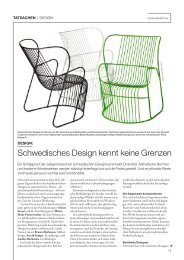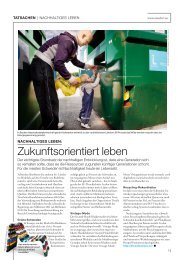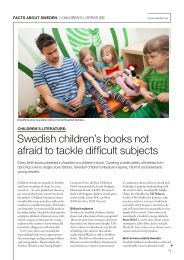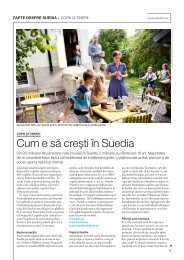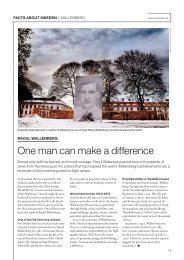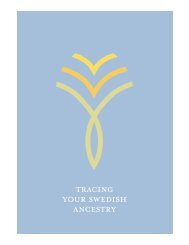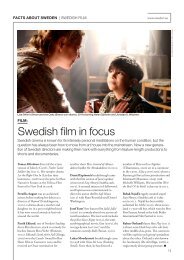Election Guide 2002 - Sweden.se
Election Guide 2002 - Sweden.se
Election Guide 2002 - Sweden.se
Create successful ePaper yourself
Turn your PDF publications into a flip-book with our unique Google optimized e-Paper software.
After the great election succes<strong>se</strong>s of the 1950s, the<br />
1960s proved to be a new period of recession for the<br />
party. By the end of the 1960s the Moderates were the<br />
smallest non-socialist party in the Riksdag.<br />
In 1970 Gösta Bohman was elected to succeed as Party<br />
Chairman, and a new period of dynamism and election<br />
success followed. In the 1979 election the Moderate<br />
Party became the biggest of the non-socialist parties.<br />
Non-socialist co-operation<br />
During the 1960s the Right Party worked to being about<br />
co-operation between the non-socialist parties, to create<br />
a governmental alternative to the Social Democrats,<br />
who, with only one very brief intermission, had ruled<br />
<strong>Sweden</strong> since 1932. But it was not until the 1970s that<br />
the three parties were able to agree on a political<br />
alternative.<br />
The non-socialist election victory of 1976 meant the<br />
achievement of a long-standing aim: the long period of<br />
Social Democratic rule had at last been broken. When<br />
the leader of the Centre Party, Torbjörn Fälldin, formed<br />
the first non-socialist coalition government, this was a<br />
great victory for our party’s pursuit of non-socialist<br />
unity.<br />
Ideological offensive<br />
During the 1970s and 1980s, the party sharpened its<br />
ideological profile. Whereas previously it had been a<br />
party resisting the Social Democrats’ policy of<br />
nationalisation and central control, the party now<br />
changed its emphasis. We became the party pre<strong>se</strong>nting a<br />
political alternative of its own. Reduced taxes: people<br />
must be able to live on their earnings after tax, without<br />
having to depend on handouts! Greater freedom of<br />
choice: give individuals control over their own<br />
everyday lives! The<strong>se</strong> were demands which came to be<br />
pres<strong>se</strong>d more and more vigorously.<br />
Freedom of choice reali<strong>se</strong>d<br />
When, following the 1991 election, Carl Bildt formed a<br />
coalition government consisting of four non-socialist<br />
parties, this was the first time since 1930 that <strong>Sweden</strong><br />
78




